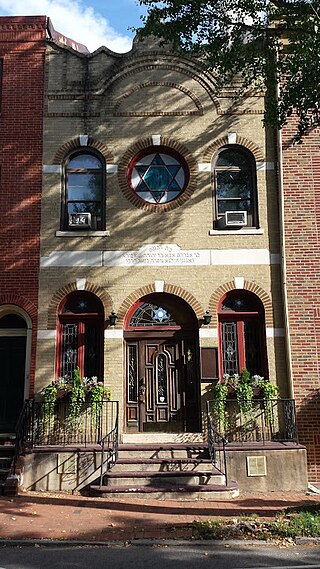Related Research Articles

Jewish prayer is the prayer recitation that forms part of the observance of Rabbinic Judaism. These prayers, often with instructions and commentary, are found in the Siddur, the traditional Jewish prayer book.
The Kaddish, also transliterated as Qaddish or Qadish, is a hymn praising God that is recited during Jewish prayer services. The central theme of the Kaddish is the magnification and sanctification of God's name. In the liturgy, different versions of the Kaddish are functionally chanted or sung as separators of the different sections of the service.

The role of women in Judaism is determined by the Hebrew Bible, the Oral Law, by custom, and by cultural factors. Although the Hebrew Bible and rabbinic literature mention various female role models, religious law treats women differently in various circumstances. According to a 2017 study by the Pew Research Center, women are slightly more likely to identify with Judaism. They account for 52% of the worldwide Jewish population.
Shiva is the week-long mourning period in Judaism for first-degree relatives. The ritual is referred to as "sitting shiva" in English. The shiva period lasts for seven days following the burial. Following the initial period of despair and lamentation immediately after the death, shiva embraces a time when individuals discuss their loss and accept the comfort of others.

In Judaism, a minyan is the quorum of ten Jewish adults required for certain religious obligations. In more traditional streams of Judaism, only men 13 and older may constitute a minyan; in more liberal (non-Orthodox) streams women are also counted.

Dayenu is a song that is part of the Jewish holiday of Passover. The word "dayenu" means approximately "it would have been enough", "it would have been sufficient", or "it would have sufficed". This traditional up-beat Passover song is over one thousand years old. The earliest full text of the song occurs in the first medieval haggadah, which is part of the ninth-century Seder Rav Amram. The song is about being grateful to God for all of the gifts given to the Jewish people, such as taking them out of slavery, giving them the Torah and Shabbat, and had God only given one of the gifts, it would have still been enough. This is to show much greater appreciation for all of them as a whole. The song appears in the haggadah after the telling of the story of the exodus and just before the explanation of Passover, matzah, and the maror.
Bereavement in Judaism is a combination of minhag (traditions) and mitzvah (commandments) derived from the Torah and Judaism's classical rabbinic literature. The details of observance and practice vary according to each Jewish community.
Shlock Rock is an American-Israeli Jewish rock band put together in December 1985 and officially founded in 1986, led by singer Lenny Solomon. The band parodies popular secular songs, substituting Jewish religious-themed lyrics. To date they have released 39 albums. Shlock Rock continues to record albums and perform live as of 2015, and to date has sold more than 200,000 CD's, tapes and DVDs in the contemporary Jewish rock arena. Their music is a mix of pop-rock song parodies and original rock songs in English and Hebrew. The stated purpose of the band is to spread Jewish pride, identity and awareness throughout the Jewish community, for Jewish continuity. Solomon and Shlock Rock tour around the world, playing at concerts, schools, and Jewish events. They are the only Jewish music band to play a concert in all 50 states.
Moshav, formerly known as Moshav Band, is an Israeli-American Jewish rock band originating from Moshav Mevo Modi'im. Founded in 1996 by Yehuda Solomon and Duvid Swirsky, the group moved to Los Angeles in 2008 and have released ten studio albums. With a sound incorporating elements of alternative rock, folk, funk, and reggae, they were credited, alongside Soulfarm and Blue Fringe, with advancing Jewish rock in the early 2000s.

The Priestly Blessing or priestly benediction, also known in rabbinic literature as raising of the hands, rising to the platform, dukhenen, or duchening, is a Hebrew prayer recited by Kohanim. The text of the blessing is found in Numbers 6:23–27.
Yishtabach is a prayer in the final portion of the Pesukei Dezimra morning prayers of Judaism known as shacharit, recited before the second kaddish leading to the Shema prayers.
Partnership minyan is a religious Jewish prayer group that seeks to maximize women's participation in services within the confines of Jewish law as understood by Orthodox Judaism. This includes enabling women to lead parts of service, read from the Torah, serve in lay leadership positions, sit in a more gender-balanced format, and in some cases count as part of a minyan ("quorum") of ten men and ten women. Partnership minyanim began in 2002 simultaneously in New York and Jerusalem, and have now spread to over 30 communities in at least five different countries around the world.

Stanton Street Synagogue, also known as Stanton Street Shul and Congregation Bnai Jacob Anshei Brzezan, is a historic synagogue located at 180 Stanton Street on the Lower East Side of Manhattan, New York. It was constructed in 1913 by a landsmanshaft from the town of Brzeżany in southeast Galicia. The first Rabbi of the congregation, in their first building, was Rabbi Judah Leib Rose (1867-1946). He had arrived in New York in 1909 and encouraged the congregation to build the Shul on Stanton Street.
Baruch Adonai le'Olam is a compilation of 18 verses from Tanach that is recited by some minyanim during weekday Maariv between Shema and Amidah. Its name is from the first 3 words of the first verse.

Maariv or Maʿariv, also known as Arvit, or Arbit, is a Jewish prayer service held in the evening or night. It consists primarily of the evening Shema and Amidah.
The Maccabeats are an American Orthodox Jewish all-male a cappella group. Founded in 2007 at Yeshiva University, Manhattan, New York, the 14-member group specializes in covers and parodies of contemporary hits using Jewish-themed lyrics. Their breakout 2010 Hanukkah music video for "Candlelight", a parody of Mike Tompkins' a cappella music video for Taio Cruz's "Dynamite", logged more than two million hits in its first ten days; the video has been viewed more than 16 million times as of 2022. They have recorded three albums and one EP, and frequently release music videos in conjunction with Jewish holidays. They tour worldwide and have performed at the White House and the Knesset.

Benzion Hakohen "Benny" Friedman is an American Hasidic Jewish singer and a non-pulpit rabbi. Professionally trained in voice, he rose to prominence on the Orthodox pop scene with his first album in 2009. Singing mainly in Hebrew, Friedman tours extensively and also appears in music videos. He views his music as a shlichus (outreach) tool, with the goal of drawing Jews closer to Judaism.
Knesseth Israel Congregation is an Orthodox Jewish synagogue, located at 3793 Crosby Drive Mountain Brook, in Birmingham, Alabama, in the United States. The congregation was formed in 1889. Eytan Yammer, a graduate of Yeshivat Chovevei Torah, served as rabbi from 2010 through 2016 and was named by The Forward as one of its 33 most inspiring American rabbis in 2015.

The Vilna Congregation was a synagogue located in the Society Hill section of Center City, Philadelphia. The synagogue was home to an active congregation with Shabbat and holy day services, was affiliated with Lubavitch of Center City, and is now the location of an orthodox women's mikvah run by the Lubavitch Hasidic community. Menachem Schmidt was the rabbi of the synagogue, and continues to oversee the property and its operations.
Yehuda Solomon is an Israeli-American singer, songwriter, and hazzan. He is the lead singer and co-founder of the band Moshav, which heavily influenced Jewish rock in the late '90s. He is the son of Diaspora Yeshiva Band member Ben Zion Solomon, while his siblings include Noah Solomon of Soulfarm.
References
- ↑ Scheinfeld, BenZion. "Minyan Man COVID-19: The Evolution of a Song". jewishlink.news. Jewish Link. Retrieved April 7, 2020.
- ↑ "06 – Who Can Be Counted in a Minyan?". Peninei Halakha. January 2, 2010. Retrieved November 29, 2018.
- ↑ Kogan, Rabbi Shmuel (2018). "Why Are Ten Men Needed for a Minyan?". Chabad.org . Retrieved November 27, 2018.
- ↑ "Minyan: The Prayer Quorum". Chabad.org. 2018. Retrieved November 28, 2018.
- 1 2 De Lange, Nicholas (2008). The Penguin Dictionary of Judaism. Penguin UK. p. 438. ISBN 9780141917108.
- ↑ Eisenberg, Ronald L. (2015). 850 Intriguing Questions about Judaism: True, False, or In Between. Rowman & Littlefield. p. 178. ISBN 9781442239470.
- ↑ "Minyan Man: The duties performed by them in the synagogue". Otago Witness . January 21, 1887. Retrieved November 27, 2018.
- ↑ Eisenberg, Ronald L. (2010). Jewish Traditions: A JPS Guide (Revised ed.). Jewish Publication Society. p. 373. ISBN 9780827610392.
- ↑ "Minyan Man: Sydney Brenner, Scientist". Web of Stories . 2018. Retrieved November 28, 2018.
- 1 2 3 "Shlock Rock Hall of Fame". Shlock Rock. 2016. Retrieved November 27, 2018.
- 1 2 Fishbein-Gold, Jennifer (November 17, 2002). "Aussie Jewboys Who Rock". New Voices . Retrieved November 27, 2018.
- ↑ "Shlockapella". jewishmusic.fm. 2018. Retrieved November 27, 2018.
- ↑ "Minyan Man". cdbaby.com. Retrieved November 27, 2018.
- ↑ Benjamin, Henry (September 19, 2002). "Synagogue leader by day, punk rocker by night". Jewish Telegraphic Agency . Retrieved November 27, 2018.
- 1 2 3 4 "Minyan Man – Shlock Rock Feat. The Maccabeats! [Music Video]". thejewishinsights.com. May 7, 2015. Retrieved November 27, 2018.